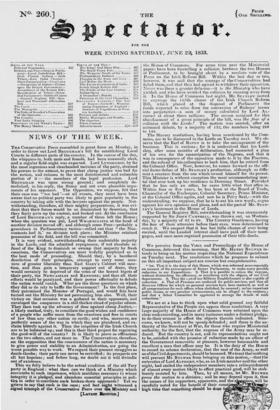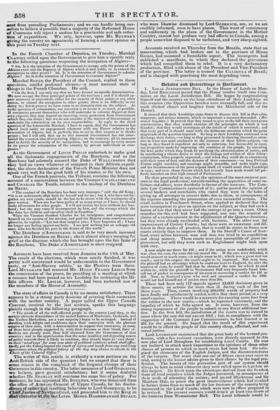We perceive from the Votes and Proceedings of the House
of Commons, delivered this morning, that Mr. HENRY BULWER in- tends to bring on his motion respecting, the National Expenditure on Tuesday next. The resolutions which he proposes to submit on this all-important subject are concise but comprehensive.
" 1st. That it is the duty of this House, which was reformed more especially on account of the extravagance of former Parliaments, to make every possible reduction in our Expenditure. 2. That it is possible to reduce the expense, without diminishing the efficiency, or interfering with the objects, of our• Civil departments. 3. That the cast of our Military Establishments is also capable of reduction. 4. That all Pensions not conferred for public services, and that all Sinecure Offices for which no personal services have been rendered, as well as all compensations for such offices when abolished, be resumed ; unless important public claims, or very peculiar circumstances, can be alleged to the contrary ; and that a Select Committee be appointed to arrange the details of such reductions."
We are at a loss to think upon what solid ground any faithful Representative of the People can oppose these resolutions. A very large majority of the House of Commons were returned upon the clear• understanding, and in many instances under a distinct pledge, to do their utmost to effect the objects therein indicated. Sine- cures, we know, will not be openly defended ; and there is the au- thority of the Secretary at War, for those who require Ministerial authority, for the fact, that the expense of the Army may be re- duced. But the country is not, and its representatives ought not to be, satisfied with the promise of reduction made by an officer of the Government removable at pleasure, however honourable and excellent a man that officer may be. It is the duty of the House to record its solemn declaration, that the cost of the Army, as well as of the Civil departments, should be lessened. We trust that nothing will prevent Mr. BULWER from bringing on this motion,—that the entreaties of Lord ALTHORP, who, as an Irish member said the other night, had smiled the independent members into a relinquishment of almost every motion likely to effect practical good, will be stub- bornly resisted by him. Then, by all means, let Mr. BULWER press the motion to a division; and he may depend upon it, that
the names of his supporters, opponents, and the a tees will be carefully noted for the benefit of their coast' 6aaptl ly
high time that something should be done t sent from preceding Parliaments; and we can hardly bring our- selves to believe it possible that a majority of the Reformed House of Commons will reject a motion for a practicable and safe reduc- tion of expenditure. We rely, however, upon Mr. BULWER'S giving the country an opportunity of forming a correct opinion on this point on Tuesday next.



















